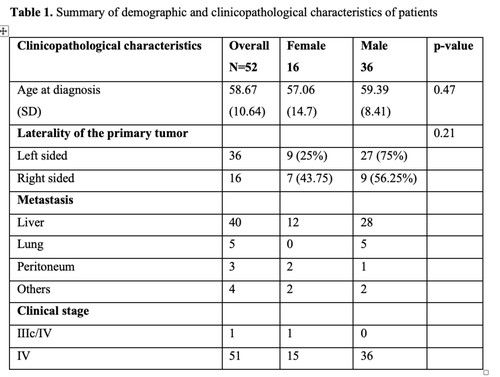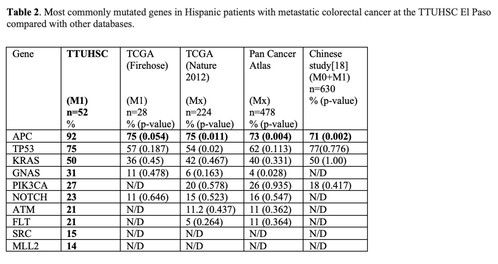1. Texas Tech University Health Sciences Center Lubbock. Department of Internal Medicine. Division of Hematology-Oncology. Lubbock,Texas, United States of America. alexander.philipovskiy@ttuhsc.edu
ABSTRACT
Globally, colorectal cancer (CRC) is the second most commonly diagnosed cancer in women and the third in men,with an overall male-female ratioof approximately 1.32:1.According to the World Health Organization GLOBOCAN database,in 2019 was diagnosed approximately 1.8 million new cases and almost 861,000 deaths. In the United States,CRC is the third most frequent type of cancer and the second leading cause of cancer-related death. In 2021,approximately 147,950 individuals will be diagnosed with CRC, and 53,500 will die from the disease in the United States. About 20-30% of patients with CRC have metastatic disease at the initial presentation, with a clinically significant detrimental effect on prognosis. Metastatic CRC (mCRC) carries a poor prognosis, and rare can be cured in selected patients with oligometastatic disease. Racial disparities were reported as an important prognostic and predictive factor of the clinical outcomes.
Globally, colorectal cancer (CRC) is the second most commonly diagnosed cancer in women and the third in men,with an overall male-female ratioof approximately 1.32:1.According to the World Health Organization GLOBOCAN database,in 2019 was diagnosed approximately 1.8 million new cases and almost 861,000 deaths. In the United States,CRC is the third most frequent type of cancer and the second leading cause of cancer-related death. In 2021,approximately 147,950 individuals will be diagnosed with CRC, and 53,500 will die from the disease in the United States. About 20-30% of patients with CRC have metastatic disease at the initial presentation, with a clinically significant detrimental effect on prognosis. Metastatic CRC (mCRC) carries a poor prognosis, and rare can be cured in selected patients with oligometastatic disease. Racial disparities were reported as an important prognostic and predictive factor of the clinical outcomes.
INTRODUCTION
Interestingly, the overall incidence of CRC among the Hispanic population has been declining over the last decades. Recently, however, adramatic increase inCRC incidentswas reported among Hispanics younger than 50 years of age (early-onset CRC). The increase in the incidence of early-onset CRC was markedly more significantin Hispanics (45%) than in non-Hispanic Whites (NHW) (27%) and African Americans (AA) (15%). Also,in contrast to NHW, Hispanics have a worse survival rate. The exact reason for racial disparities, however, is not well understood. Studies suggested thepossibility of different driver mutations anddifferent biology of colon cancer among different racial/ethnic groups. The biology of CRC in Hispanic-Latino (HL) patients has been poorly characterized. However, some recent data suggest that the molecular drivers might be very different among this ethnic group. This study aimed to characterize gene mutationprofiles among Hispanic patients with metastatic CRC and possibly identify correlations with clinical outcomes. In addition, we aimed to better understand the biology of the disease among Hispanic patients and possibly identify new therapeutic targets.
Interestingly, the overall incidence of CRC among the Hispanic population has been declining over the last decades. Recently, however, adramatic increase inCRC incidentswas reported among Hispanics younger than 50 years of age (early-onset CRC). The increase in the incidence of early-onset CRC was markedly more significantin Hispanics (45%) than in non-Hispanic Whites (NHW) (27%) and African Americans (AA) (15%). Also,in contrast to NHW, Hispanics have a worse survival rate. The exact reason for racial disparities, however, is not well understood. Studies suggested thepossibility of different driver mutations anddifferent biology of colon cancer among different racial/ethnic groups. The biology of CRC in Hispanic-Latino (HL) patients has been poorly characterized. However, some recent data suggest that the molecular drivers might be very different among this ethnic group. This study aimed to characterize gene mutationprofiles among Hispanic patients with metastatic CRC and possibly identify correlations with clinical outcomes. In addition, we aimed to better understand the biology of the disease among Hispanic patients and possibly identify new therapeutic targets.
MATERIALS AND METHODS
We collected formalin-fixed paraffin-embedded (FFPE) tumor tissues from 52 patients with metastatic CRCand analyzed the gene mutation profiles. We compared the results with individual patient's clinical histories and outcomes. Of 52patients with CRC,52(100%) identified as HL.
We collected formalin-fixed paraffin-embedded (FFPE) tumor tissues from 52 patients with metastatic CRCand analyzed the gene mutation profiles. We compared the results with individual patient's clinical histories and outcomes. Of 52patients with CRC,52(100%) identified as HL.
RESULT
The most commonly altered genes among HL patients were APC, KRAS, TP53, PIK3CA, NOTCH,and GNAS.Wedemonstrated statistically significant higher frequencies alteration of these genes among HL patientscompared with other international cancer databases. The prevalence of the mutation in the APCgene was significantly higher among male patients. In addition, we identified a rare mutation in the MLLgene, which was more common in right-sided cancers.
The most commonly altered genes among HL patients were APC, KRAS, TP53, PIK3CA, NOTCH,and GNAS.Wedemonstrated statistically significant higher frequencies alteration of these genes among HL patientscompared with other international cancer databases. The prevalence of the mutation in the APCgene was significantly higher among male patients. In addition, we identified a rare mutation in the MLLgene, which was more common in right-sided cancers.


CONCLUSION
Presented data support the notion that molecular drivers of colon cancer might be different in HL patients compared with other racial/ethnic groups. Therefore, a deeper understanding of the biological mechanisms of CRC mutations may lead to discovering new biological targets and subsequently to the new approachin management of CRC.
Presented data support the notion that molecular drivers of colon cancer might be different in HL patients compared with other racial/ethnic groups. Therefore, a deeper understanding of the biological mechanisms of CRC mutations may lead to discovering new biological targets and subsequently to the new approachin management of CRC.
DISCLOSURES
-
-
The data in this poster was presented at World Congress on Gastrointestinal Cancer 2021. Published with permission from the Copyright owner.
